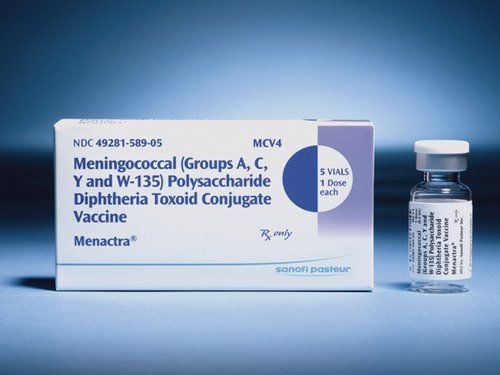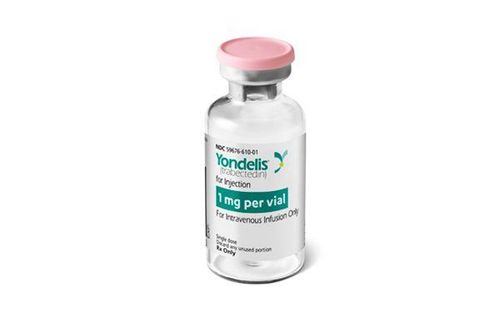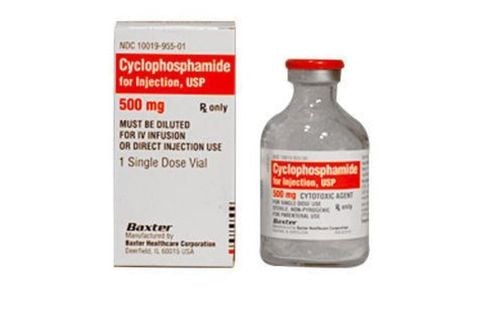This is an automatically translated article.
Hyxure contains the active ingredient Hydroxyurea, also known as Hydroxycarbamide, which is commonly used in the treatment of sickle cell disease, primary polycythemia vera, chronic myelogenous leukemia, cervical cancer, ...
1. What does Hyxure do?
Hyxure contains the main active ingredient Hydroxyurea, also known as Hydroxycarbamide, which has a selective inhibitory mechanism on ribonucleoside diphosphate reductase - the enzyme needed to convert ribonucleoside diphosphate to deoxyribonucleotide diphosphate - meaning that cells do not have material for DNA synthesis, thereby reducing the cell's DNA synthesis. At that time, the cell will not be able to pass the G1 phase (the stage of synthesizing substances necessary for growth) and the S phase (the stage of chromosome replication) to move on to other phases of the cell cycle. . At that time, the cell replication process will temporarily stop. As a result, Hydroxyurea works to slow or stop the growth of cancer cells in the patient's body - one of the main mechanisms in cancer treatment.
Hyxure is used alone or together with other drugs or radiation therapy to treat certain types of chronic primary leukemia and some cancers such as mouth, cheeks, and tongue cancers. , throat, tonsils, and sinuses... Hydroxyurea is used to reduce the frequency of pain attacks and reduce the need for blood transfusions in children 2 years of age and older and adults with sickle cell anemia - a medical condition an inherited blood disorder in which red blood cells are abnormally shaped (crescent-shaped) and cannot deliver enough oxygen to the entire body. Hydroxyurea is an anti-metabolic drug that can treat sickle cell anemia by preventing the formation of sickle cells.
The mechanism of action of Hyxure in the treatment of sickle cell anemia is not really proven, only that Hydroxyurea can increase fetal hemoglobin levels. It is hypothesized that Hydroxyurea increased nitric oxide levels, causing activation of soluble guanylyl cyclase and leading to cyclic GMP activation. Thereby activating gamma globin gene expression, which leads to the activation of the next gamma globin chain - the necessary material for the production of fetal hemoglobin (HbF), which is hemoglobin that polymerizes and deforms red blood cells. as HbS causes sickle cell disease. There is still about 1% of erythrocytes containing HbF in adult blood. These cells belong to a very small group that is still able to produce HbF even after the body has matured. In addition, Hydroxyurea also reduces the production of granulocytes in the bone marrow, thereby having a mild immunosuppressive effect, especially at sites of small and narrow blood vessels, blocked by red blood cells. sickle cannot go through.
In patients with sickle cell anemia, Hyxure has the following main effects:
Reduces hospital admissions and reduces pain in both children and adults. Maintain the spleen function of the newborn. Clinically effective in children with other sickle cell-related organ damage such as spleen dysfunction, proteinuria, hypoxemia, pulmonary hypertension, increased glomerular filtration rate, infarction silent cerebral blood flow, neurocognitive retardation, helping to prevent primary stroke and prevent secondary stroke. Ensure the normal development of both physical and intellectual for children with sickle cell disease. Support the treatment of acute embolism in both children and adults. Indications of Hyxure:
Treatment of sickle cell anemia. Treatment of skin melanoma, chronic myeloid leukemia, recurrent, metastatic cancer or ovarian cancer in inoperable cases. Combined with radiation therapy in carcinoma of the head and neck.
2. How to use Hyxure medicine.
Hyxure medicine is made in the form of tablets, taken orally.
Dosage of Hyxure drug depends on the patient's weight, health condition, test results as well as response to treatment. Some basic doses:
Treatment of hard tumors:
+ Intermittent therapy: 1 dose of 80 mg/kg/3 days.
+ Continuous therapy: 1 dose of 20 - 30mg/kg/day.
+ Combination therapy: 80mg/kg/day.
Treatment of chronic myeloid leukemia: 20 - 30mg/kg/day.
3. Some notes when using Hyxure drug.
3.1. Contraindicated. Do not use Hyxure in the following cases:
Patients with severe myelosuppression, leukocytes below 2,500/mm3, platelets less than 100,000/mm3, severe anemia. People who are sensitive to the drug or any of its ingredients. Pregnant women. 3.2. Side effects. Hyxure may decrease the number of blood cells in the bone marrow by large numbers, increasing the risk of serious infection or bleeding. Common symptoms may include fever, chills, fatigue, extreme weakness, body aches, sore throat, shortness of breath, persistent cough and congestion, unusual bleeding or bruising, vomiting blood or brown substance like coffee grounds, bloody stools or black, tarry stools...
Hyxure medicine can cause some common side effects and requires urgent medical attention if the following conditions are serious. or prolonged:
Nausea, vomiting. Diarrhea or constipation Loss of appetite. Weight gain. Ulcers in the mouth and throat. Skin rash, pale Dizziness, headache. Hair loss, skin and nail changes. There are also some effects to note:
Heart palpitations. The constant pain starts in the stomach area, especially the upper right part, then can spread to other locations. Wounds or sores in the legs. Pain, itching, redness, swelling or blisters on the skin Blood in the urine Yellowing of the skin or eyes. Numbness, burning, or tingling in the palms or feet Fever, cough, trouble breathing, and other respiratory problems. 3.3. Drug interactions. Using Hyxure with drugs that cause bone marrow suppression or radiation therapy may increase the risk of bone marrow failure. Hydroxyurea increases serum uric acid levels, so it is necessary to adjust the dose of uricosuric drugs when co-administered with Hyxure. Combination therapy of Hyxure with antiretroviral agents, especially didanosine and stavudine, may increase the risk of severe peripheral neuropathy in some HIV-infected patients, pancreatitis, and potentially fatal hepatotoxicity . 3.4. Another note. At least 6 weeks of treatment is required to see the anti-tumor effect of Hyxure. When the tumor decreases in size, it is still advisable to continue taking the medication as prescribed. The drug should be discontinued if the white blood cell count falls below 2,500/mm3 or the platelet count falls below 100,000/mm3. After 3 days, the blood count is rechecked and the drug can be re-administered when the white blood cell and platelet levels are at an acceptable level. If there is no recovery during combination therapy with radiation therapy, then radiation therapy must be discontinued. The general condition of the blood, including bone marrow, should be checked, and renal and liver function should be checked before and during treatment. In case of severe anemia, blood replacement is required before treatment with Hyxure. Hydroxyurea reduces plasma clearance and iron utilization by erythrocytes but will not alter erythrocyte survival time. If there is pain from mucositis at the site of radiation therapy, topical or oral analgesics may be used. If severe, it may be necessary to temporarily stop taking Hyxure . If it is too severe, the radiation therapy must also be stopped. However, it is very rare to have to stop taking the drug. Skin vascular toxicity including vascular ulceration and necrosis may occur in patients with bone marrow hyperplasia treated with Hyxure, possibly increasing the risk of vasculitis toxicity in patients receiving concomitant interferon therapy. . Hyxure drug can increase the concentration of uric acid in the serum, causing gout, the worst condition is uric acid nephropathy, especially when using the drug with other cytotoxic substances. Therefore, it is necessary to regularly monitor uric acid levels and maintain plenty of water in the body throughout the treatment period. Gastrointestinal disturbances such as nausea, vomiting, and anorexia associated with combination therapy may be alleviated by temporary discontinuation of the drug. Dosage reduction in patients with renal impairment and control of hematological parameters in these patients should be considered during dosing. For patients with hepatic impairment, there are no data on dose adjustment. However, it is still necessary to monitor hematological parameters in these patients. Hydroxyurea is secreted into breast milk. Therefore, Hyxure should only be used in nursing women when the benefits of the drug and the possible risks have been weighed. Care should be taken when administering Hyxure with other cytotoxic drugs. During treatment with Hyxure, it is necessary to maintain regular examinations and tests as indicated. When there are any problems or unusual symptoms, it is necessary to contact emergency medical care for timely support.
Please dial HOTLINE for more information or register for an appointment HERE. Download MyVinmec app to make appointments faster and to manage your bookings easily.













